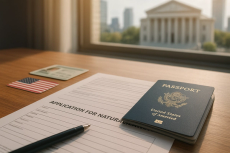Blog • Published on:October 1, 2025 | Updated on:October 1, 2025 • 12 Min
Best Second Passports to Get in 2025
In today’s world of geopolitical unrest, new tax rules, and growing travel restrictions, a second passport has become a valuable asset.
For HNWIs, entrepreneurs, global families, and mobility-minded investors, securing alternative citizenship offers more than visa access. It provides protection, flexibility, and a pathway to financial and geographic freedom.
Not all second passports are equal. In 2025, the real value of a program depends on more than polished marketing. Our rankings draw on global mobility indexes, real client experience, and over 15 years of experience as a government-authorized agent.
This is not a wish list of attractive passports. It is a practical, data-driven guide to the programs that bring real long-term advantages and how you can access them.
Why Trust Our Second Passport Rankings
When choosing a second passport, credibility matters. With countless unverified lists and promotional claims online, it is important to rely on expertise backed by government recognition and proven client success.
Our Track Record
- A British family company with a 200+ year heritage of trust
- 11,000+ successful applications for citizenship and residency by investment
- Over 15 years dedicated exclusively to this field
- Government-authorized agent for multiple programs worldwide
- Among the first firms authorised by all five Caribbean CBI countries
- Rated 4.98/5 on Google Reviews from verified clients
Our Evaluation System
Every year we review the best second passports based on six measurable factors. This ensures our rankings are balanced, practical, and relevant to investors.
- Visa-free travel – number and quality of destinations
- Processing time – speed and certainty of approval
- Investment threshold – minimum required outlay
- Family inclusion – how broadly dependents can be added
- Return on investment potential – resale and recovery of funds
- Long-term benefits – stability, taxation, and generational advantages
This framework allows us to score programs consistently and recommend the best fit for each profile, whether you’re an entrepreneur, a family looking for security, or a frequent traveller seeking global mobility.
Top 8 Best Second Passports in 2025
When comparing second passports, there is no one-size-fits-all answer. The best choice depends on your goals, mobility, investment return, family security, or speed of access.
Below is our 2025 ranking based on visa-free travel, processing time, investment threshold, family inclusion, ROI potential, and long-term benefits.
Comparison Table: Best Second Passports 2025
Each second passport has its strengths. For example, Saint. Kitts and Nevis remains the most established, Grenada offers the advantage of a US E-2 visa treaty, and Antigua and Barbuda stands out for family packages.
São Tomé and Príncipe is the lowest-cost entry point, while Türkiye provides premium mobility and investment potential through real estate.
Caribbean Passports: Best for Speed and Value
If you ask most investors where to start when it comes to second citizenship, the answer is usually the Caribbean.
These nations pioneered the concept of Citizenship by Investment (CBI) and still dominate the market today.
The appeal is simple: reasonable costs, fast processing times, family-friendly options, and strong visa-free access to Europe, Asia, and beyond.
While all Caribbean programs share these advantages, each has its own personality and edge. Below we break down the standouts for 2025.
To learn more about the region’s programs, read our blog Second Passport Options in the Caribbean Through Citizenship by Investment.
Saint Kitts and Nevis
Saint Kitts and Nevis is often described as the “gold standard” of Caribbean citizenship. And for good reason: it launched the world’s first CBI program in 1984 and has been running ever since without interruption.
- Investment: From $250,000 (Sustainable Island State Contribution)
- Processing time: 4–6 months
- Visa-free travel: 150+ destinations, including the UK, EU Schengen Zone, Hong Kong, and Singapore
For investors who want certainty, Saint Kitts and Nevis is hard to beat. Its government enforces the region’s strictest due diligence, making its passport one of the most respected globally.
Grenada
Grenada sets itself apart with a rare advantage: it is the only Caribbean country with a treaty granting access to the U.S. E-2 Investor Visa.
This means passport holders can invest in a business and live in the United States, a privilege no other Caribbean citizenship currently provides.
- Investment: From $235,000 (National Transformation Fund Donation)
- Processing time: 6–8 months
- Visa-free travel: 140+ destinations, including China and Singapore
For entrepreneurs and business owners, Grenada’s passport offers flexibility that goes far beyond the Caribbean region.
Antigua and Barbuda
If your goal is to secure citizenship for more than just yourself, Antigua and Barbuda is one of the most cost-efficient family options on the market.
A single application can cover a family of four without significant additional costs.
- Investment: From $230,000 (National Development Fund Contribution)
- Processing time: 6–7 months
- Visa-free travel: 150+ destinations
This makes Antigua and Barbuda especially attractive to parents who want to future-proof their children’s global mobility.
Dominica
Dominica has consistently been one of the most affordable second passport options worldwide.
But affordable doesn’t mean low quality, the government has earned a reputation for rigorous vetting and solid global access.
- Investment: From $200,000
- Processing time: 4–6 months
- Visa-free travel: 140+ destinations
In Dominica the real estate pathway is priced at the same level as the Economic Diversification Fund contribution, giving investors the option to tie citizenship to property ownership.
Saint Lucia
Saint Lucia is the Caribbean’s most versatile program. Unlike others, it offers four distinct routes: donation, real estate, enterprise investment, and even government bonds.
The latter is especially appealing, since capital is repaid after a holding period.
- Investment: From $240,000
- Processing time: 4–6 months
- Visa-free travel: 150+ destinations
This makes Saint Lucia a favourite among investors who want options beyond a simple donation.
São Tomé and Príncipe
2025 brought the launch of Africa’s newest CBI program in São Tomé & Príncipe, a small island nation in the Gulf of Guinea.
It is one of the most affordable passports in the world, with a starting point of just $90,000.
- Investment: From $90,000 (donation)
- Processing time: 1–2 months
- Visa-free travel: 99+ destinations (regional focus in Africa, Asia, and the Caribbean)
While mobility is more limited than Caribbean peers, this program offers a fast, low-cost route to dual citizenship and is already gaining traction with early investors.
Türkiye Citizenship — A Premium Passport with Real Estate Appeal
While the Caribbean dominates the fast-track second citizenship market, Türkiye offers something different: a large, dynamic economy, real estate opportunities, and unique mobility benefits.
For investors who want more than a travel document, Türkiye combines lifestyle, business advantages, and long-term upside.
Why Türkiye?
Unlike smaller island programs, Türkiye is a G20 nation bridging Europe and Asia.
Its citizenship program has attracted tens of thousands of applicants since its launch, particularly from investors who value real estate ownership.
- Investment: From $400,000 (real estate purchase)
- Processing time: 6–8 months
- Visa-free travel: 110+ destinations, including Japan, South Korea, and much of Latin America
- Unique advantage: Treaty access to the US E-2 Investor Visa (similar to Grenada), allowing citizens to live and work in the United States via business investment
You can read more about investment routes and benefits in our blog Türkiye Citizenship by Investment.
Real Estate ROI
Türkiye’s property market has been one of the most resilient in recent years, with Istanbul, Antalya, and Ankara seeing strong demand from both locals and foreigners.
Investors can qualify for citizenship through real estate purchases and later resell the property after the mandatory holding period, making this a program with true capital recovery potential.
Client Success Case Study
One of our clients, a Middle Eastern entrepreneur, purchased a $600,000 apartment in Istanbul’s business district through the program.
Within six months, he secured his Turkish passport, gained access to the E-2 Visa for the US, and now enjoys both regional mobility and a strong rental yield from his investment property.
Which Second Passport Fits Your Profile?
Choosing the right second passport is not just about numbers, it’s about fit.
Your goals, family situation, and timeline will determine which program makes the most sense.
Here are the most common questions we hear from clients in 2025.
What’s your primary goal?
- Global mobility: If you want visa-free travel to Europe and Asia, Saint. Kitts and Nevis or Grenada provides excellent reach.
- Business expansion: If US market access is important, Grenada and Türkiye are your best bets thanks to the E-2 Visa treaty.
- Tax planning / insurance policy: Caribbean passports often work well as part of an international structuring plan.
What’s your investment capacity?
- $90,000–200,000: Budget-friendly options include São Tomé and Príncipe, Dominica, and Vanuatu.
- $200,000–250,000+: Mid-range programs like Saint Kitts and Nevis or Grenada combine strong mobility with long-term credibility.
- $400,000+: For those with higher budgets, Türkiye offers premium advantages.
How quickly do you need citizenship?
- Fastest options (2–4 months): Vanuatu and São Tomé & Príncipe.
- Balanced speed and strength (4–6 months): Dominica, Saint Lucia, Saint. Kitts and Nevis.
Do you want to include dependents?
- Large families: Antigua and Barbuda is the most cost-effective for households of four or more.
- Generational planning: All Caribbean programs allow dependents and future transfers of citizenship.
Are you looking for EU, Caribbean, or other regional benefits?
- Caribbean access: Antigua and Barbuda, Grenada, Saint Kitts and Nevis, Dominica, and Saint Lucia are all strong, with varying strengths.
- Africa’s newcomer: São Tomé and Príncipe provides the lowest-cost entry into dual citizenship.
The Savory & Partners Citizenship Process: What to Expect
Applying for a second passport may feel complex, but with the right guidance, it’s a clear and straightforward journey.
At Savory & Partners, we handle every stage with precision, ensuring that our clients move from consultation to citizenship with confidence.
Step 1 — Initial Consultation
We begin with a private consultation to understand your personal and financial goals. Whether your focus is mobility, business, family, or tax planning, we tailor recommendations to your profile.
Step 2 — Program Selection
Based on your priorities, we match you with the program that delivers the best long-term benefits. For example, a business owner eyeing the US might be guided to Grenada or Türkiye, while a family seeking affordability may lean toward Antigua and Barbuda.
Step 3 — Pre-Approval Due Diligence
Before submitting your application, we run internal checks to ensure eligibility and flag any potential issues early. This step increases certainty of approval and protects your investment.
Step 4 — Document Preparation and Submission
Our legal and processing teams handle the full documentation package, ensuring compliance with each government’s requirements. We coordinate translations, notarizations, and apostilles as needed.
Step 5 — Application Tracking
Once submitted, your application moves into the government’s review process. We provide regular updates so you’re never in the dark about progress.
Step 6 — Approval and Passport Delivery
After final approval, your passport is issued and securely delivered. For many programs, this entire process takes just 3–6 months, depending on jurisdiction.
Step 7 — Post-Citizenship Support
Our relationship doesn’t end with delivery. We continue to support clients with renewals, additional family applications, and guidance on how to maximize their new citizenship.
Common Second Passport Mistakes to Avoid
While second citizenship can open doors, making the wrong choice, or overlooking key details, can lead to wasted time, money, and missed opportunities.
Here are the most frequent mistakes investors make, and how to avoid them.
1. Choosing Based on Price Alone
It’s tempting to focus only on the lowest investment threshold, but the cheapest option is not always the best fit.
A $90,000 passport may save money upfront but might not deliver the global access or stability your family needs long-term. Always weigh cost against value.
2. Ignoring Tax Implications
Second citizenship doesn’t automatically mean lower taxes. Each person’s home country rules differ, and some require global income reporting regardless of where a passport is held. Without proper planning, you could face unexpected tax liabilities.
3. Overlooking Travel Patterns
Many applicants focus on total visa-free numbers instead of where those visas actually matter.
For example, Grenada’s access to China and the US E-2 Visa makes it valuable for entrepreneurs, while Saint Kitts and Nevis appeals more to frequent European travellers. Align the passport with your actual travel needs.
4. Underestimating Due Diligence
Every reputable program conducts strict background checks. Attempting to hide or misrepresent information can lead to rejection across multiple jurisdictions. Transparency from the start ensures smoother approvals.
5. Forgetting Family Planning
A passport that works for you today may not automatically extend to your children tomorrow. Some programs limit dependent eligibility by age or marital status. Families should consider programs like Antigua and Barbuda or Dominica, which allow broader inclusion.
Securing the Best Second Passport in 2025
In 2025, second citizenship is a tool for global freedom, business expansion, and family security. The best program for you will depend on your priorities: speed, cost, US access, EU opportunities, or long-term return on investment.
The Caribbean continues to dominate for speed and value, Türkiye provides a premium blend of mobility and real estate ROI. Meanwhile, São Tomé and Príncipe introduces a new entry-level option at an unmatched price point.
At Savory & Partners, we’ve helped over 11,000 families and investors secure their second citizenship. As a government-authorized agent, our role is to guide you through the process transparently, handle the legal and procedural work, and ensure your investment delivers lasting benefits.
If you are considering a second passport in 2025, speak to our team today. Your future mobility and security deserve nothing less than expert guidance.
Contact Savory & Partners to begin your application journey.
FAQs on the Best Second Passports in 2025
1. What is the fastest second passport to get in 2025?
The quickest approvals are usually through Vanuatu (2–3 months) and São Tomé & Príncipe (1–2 months). Caribbean programs like Dominica and Saint Lucia average 4–6 months.
2. Which second passport is best for families?
Antigua and Barbuda is the most cost-effective for larger families, allowing up to four dependents under one application. Dominica and Saint Lucia also offer broad family inclusion options.
3. Can a second passport help me move to the United States?
Yes, Grenada and Türkiye both have treaties allowing access to the US E-2 Investor Visa.
4. How much does a second passport cost in 2025?
Entry-level programs start from around $90,000 (São Tomé and Príncipe). Caribbean programs generally range from $200,000 to $250,000, while premium options like Türkiye require at least $400,000.
5. Is a second passport worth it if I already have strong mobility?
Even if your current passport provides good travel access, a second citizenship offers insurance against political risk, tax flexibility, and generational benefits. For business owners and HNWIs, it’s also a tool for investment access and market expansion.
References
International Monetary Fund. (2025). World Economic Outlook: Mobility, Trade, and Investment. International Monetary Fund. Retrieved from https://www.imf.org
OECD. (2024). International Migration Outlook 2024. Organisation for Economic Co-operation and Development. Retrieved from https://www.oecd.org/migration
United Nations. (2024). International Migration Report 2024. Department of Economic and Social Affairs. Retrieved from https://www.un.org/development/desa/pd/
World Bank. (2025). Global Investment and Mobility Report 2025. World Bank Group. Retrieved from https://www.worldbank.org
European Commission. (2024). Migration and Mobility: Policy Updates 2024. European Commission. Retrieved from https://ec.europa.eu
Written By

Laura Weber
Laura Weber is a legal expert in international tax planning and citizenship by investment. With over a decade of experience, Laura helps individuals and families navigate complex legal frameworks to secure dual citizenship and global residency options, particularly in the Caribbean and Europe.
Related Articles









Recently Published









Book a free consultation


